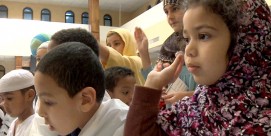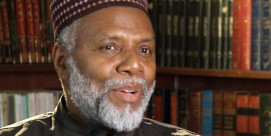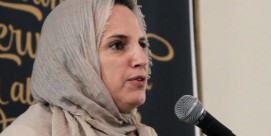LUCKY SEVERSON, guest anchor: This year, almost three million Muslims are making the hajj pilgrimage to Mecca in Saudi Arabia. It’s considered one of the five fundamental obligations of Islam. An estimated 15,000 Muslims from the U.S. traveled last year, and considerably more were expected this year. Preparations begin months in advance. Most pilgrims are accompanied by a spiritual advisor who guides them through the complex series of rituals. Imam Shaker Elsayed of the Dar Al Hijrah Islamic Center in Virginia has been on many hajjes. He went again this year and agreed to discuss the journey.
Imam SHAKER ELSAYED (Dar Al Hijrah Islamic Center): The hajj is a trip that is required of a Muslim once in a lifetime if they can afford it financially and physically. The mental preparation really takes you from the minute you get the package that you’re joining the tour and you’re confirmed. From that minute until you land there, you’re in a process of getting yourself ready -- getting your mind ready, getting your soul connected, getting your spirit ready to receive what is to come, saying prayers frequently, praising God frequently, praising God frequently -- as frequently as one can do it.
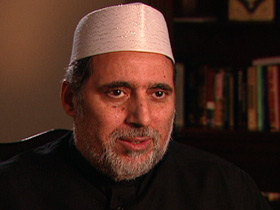
The appropriate clothes for hajj for men is this two-piece cloth that they have one over the shoulder and chest and one around like a skirt. They are not woven into any particular dress; they are just wrapped around so they can be sometimes loose. The clothing is special because you are not allowed to wear custom tailored clothes, and that really symbolizes the fact that when we die, what do we dress? A shroud. What is a shroud? It’s a white piece of cloth. So those clothes symbolize the fact of simplicity, symbolize the fact of readiness to die and meet God, symbolize the fact of equality, that all men look alike. There’s no king or prince or janitor. We’re all alike. You cannot tell who’s who.
Women will dress their modest, regular hijab. It doesn’t matter the color or the shape; it just has to be loose-fitting, wide enough.
There are certain borders or boundaries around Mecca that are determined to be the "haram" points or the points when you dress and make your intention for the trip as a whole. And as they make the intention, they say to God, Oh God, we respond to your call.
As soon as you make your intention and you close the boundaries to the haram area, the sacred holy grounds, you are prohibited from hurting anybody. You can’t even kill a fly.
You can’t kill insects, you can’t hunt animals or birds or anything. Even argument is prohibited during hajj.
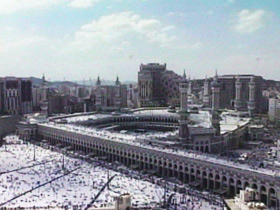
You are prohibited also from clipping your nails, shaving your hair or cutting your hair, or doing this to somebody else even. You are prohibited from perfume; you can’t wear perfume on your body or your clothes. You’re not allowed to have marital relationship during this period with your wife or anybody, and you’re not allowed to do anything that’s unethical.
SEVERSON: Eid al-Adha marks the end of the pilgrimage. A sacrificial offering is made to commemorate the prophet Abrahamís willingness to sacrifice his only son. The special clothing, ihram, is then removed, and the pilgrims shave or cut their hair in a kind of spiritual rebirth.
Imam ELSAYED: If you do the hajj properly, you come back as if you have been given a new life, a new page with God. Your previous sins are forgiven, and you are given a new chance to make good on your promises and commitment and covenant with God. So it’s kind of like we’re telling God we are your creation and we’re ready to come, travel the distance, leave behind the family, the wealth, the business, the luxury life that we love, to come to you in the simplest of forms. And our hope is you forgive us, you accept us, you embrace us, and you bless our life for your sake.



